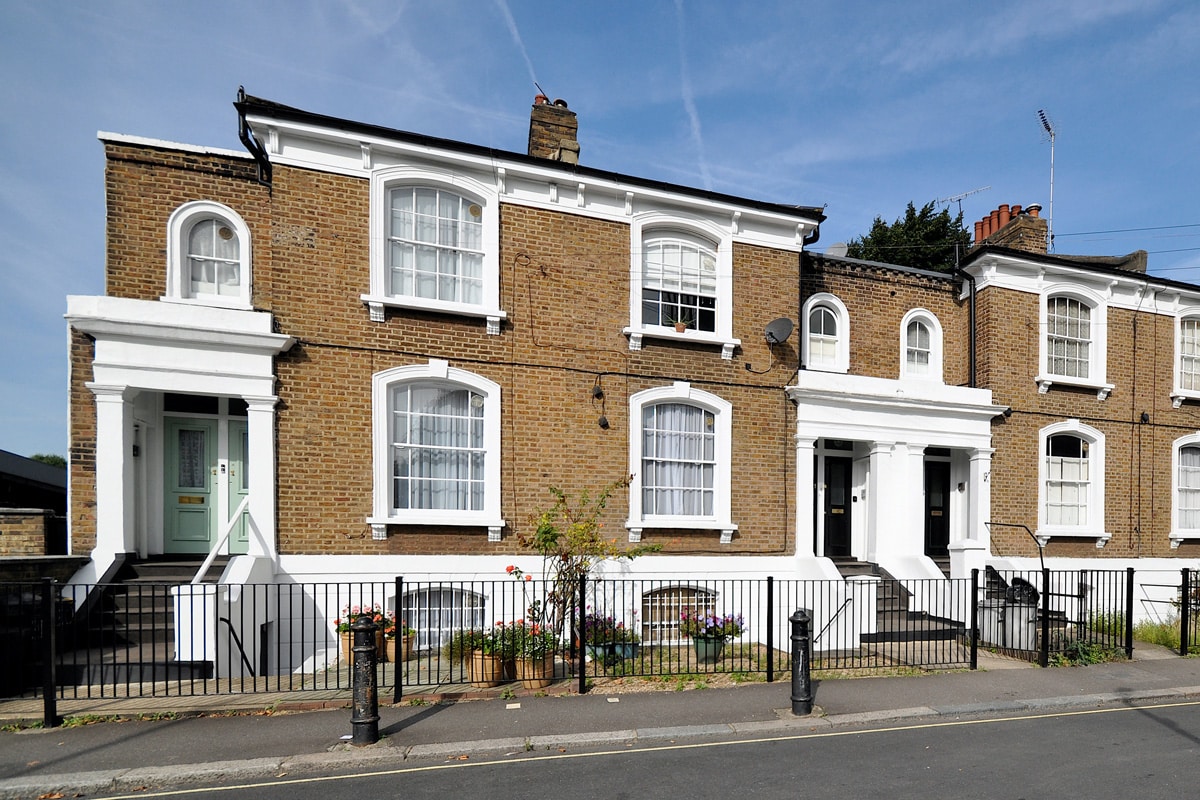What Exactly is a Maisonette?
Maisonettes represent a unique category within the UK housing market, offering a blend of features that combine the advantages of both apartments and standalone houses. This article provides an in-depth exploration of a maisonettes meaning, delving into their structure, history, and the benefits they offer.

-
by Robert Jones, Founder of Property Investments UK
With two decades in UK property, Rob has been investing in buy-to-let since 2005, and uses property data to develop tools for property market analysis.
The Meaning of a Maisonette
Maisonette is a french word, that translates to English to mean 'little house' or 'small house'.
Yet the true meaning of a maisonette in the UK property market is more like the dictionary definition
(1). a small house, especially one connected to a large apartment building. (2). an apartment, usually of two floors connected by an internal staircase; duplex apartment.
source: dictionary.com
In the UK, local builders developed early style maisonettes with one large house with self contained flats each having their own front door. These become more popular as major cities expanded and rising populations were looking for their own affordable accommodation. Especially in the best up and coming areas in London where residents were looking to buy a home.
A ground floor maisonette meaning
These were often designed with the lower floor having it's own entrance from the street and it's own garden. Providing more function and facilities than what might be considered from a typical flat.
An upper floor maisonette meaning
The upper maisonette would have it's own front door from the street too, leading to a staircase with access to the upper parts of the building.
House vs Maisonette
These were essentially houses, designed in such a way to create a smaller more apartment style living (hence the word 'little house'). Yet houses were too expensive for many, and the need for such large homes that had traditionally previously been required, was no longer the case.
The development of maisonettes therefore filled a gap with the more affordable type of housing that apartments provided, but with the privacy, security and extra amenities (garden space, loft space) that houses provided, without the extra cost and wasted space.
In simple terms, to define a maisonette, it is a self-contained flat or apartment within a larger building. Maisonettes are often on two floors with an internal staircase between them creating duplex style living.
Flat vs Maisonette
The difference between flats and maisonettes is often simply how they are accessed. Apartments are often inside larger buildings and accessed from a communal corridor. Maisonettes on the other hand have their own front door on to the street or external of the building, providing more privacy and a more 'homely' feel for some.

Access our selection of exclusive, high-yielding, off-market property deals and a personal consultant to guide you through your options.
History and Evolution of Maisonettes and Duplex Living
The concept of maisonettes originated in Europe, particularly in France and the UK, where they were initially designed as a solution for housing shortages in densely populated urban areas, after a series of wars had destroyed buildings, and affordable homes were a key part of the rebuilding efforts.
These have been built across different eras in the UK, including the Victorian era (although this era is more commonly known for the Victorian gothic style house) and the Edwardian house era.
Over time, they have evolved and adapted to various cultural and architectural contexts, becoming a popular housing option in many parts of the world.
In the past, maisonettes were sometimes associated with social housing (not unlike how people used to define tenements) and were seen as a less desirable option compared to standalone houses. However, in recent years, they have undergone a transformation and are now considered a stylish and sophisticated choice of dwelling. This shift in perception can be attributed to modern architectural designs and the growing appreciation for compact, efficient living spaces.
What You Need to Know About Maisonettes
Maisonettes are pretty versatile, and although the definition of a maisonette, as above, is quiet straight forward, you maybe surprised to see how many different street scenes include this housing style, including:
- They can be found in blocks either with other maisonettes or a block with both flats and maisonettes.
- It’s also possible to find maisonettes as a terrace house building within a row of terraced houses.
- Maisonettes may also be found above commercial premises, such as where the ground floor is a shop, and there is a seperate front door leading to a staircase to the first and second floors of the building to form a duplex maisonette.
- Maisonettes can be purpose-built blocks or they can be in conversions of other types of buildings.
Additional things to consider
Locations
You will find maisonettes in all major cities across the UK that had a housing boom around the early to mid 1900s and 1950s.
This includes good areas in Manchester and the best areas in Birmingham.
Price ranges
Maisonettes can be found at all price levels. High-end luxury maisonettes can cost £1 million or more, especially when you consider the most expensive areas in London, many apartments alone are over this price range.
Yet in some part of the country it’s possible to find ex-local authority maisonettes for as little as £50,000, especially when you consider some of the cheapest houses for sale in Manchester can be not far from this price in the Greater Manchester regions.
Property Tenure
You maybe thinking are all apartments leasehold? and therefore are maisonettes leasehold?
No, not all. Tenure for apartments and maisonettes are commonly leasehold as it provides an obvious structure for the maintenance and the upkeep of the communal parts and common structure. Yet it is important to check if you are thinking of buying a maisonette what the tenure is.
Interestingly, maisonettes make ideal developments for investors finding renovation properties, as they can be developed on the ground floor with an extension and the upper duplex floors with a loft conversion. They can also be good to add value, if they are a leasehold by extending the lease.
Based on all the above you can see why they make such interesting and versatile homes for owner occupiers, tenants and property developers.

The Advantages of Maisonettes
As above, maisonettes have lots of advantages over houses and there are some differences between a maisonette and an apartment.
These can include
- Combining the security, safety and homeliness of a house with the affordability of an apartment.
- Ground floor maisonettes mean you can have access from the street and you don’t need to climb several flights of stairs or use a lift.
- Maisonettes have their front door to the outside providing a more traditional 'house' and 'little home' feel.
- Maisonettes can offer more privacy than flats, as they don’t have communal indoor areas.
- Some maisonette styles provide duplex living with the living and sleeping areas on separate floors. The advantage here is that the bedrooms are quieter than in a flat, which can be useful for those who have children.
- Maisonettes usually offer more space than a flat as they are often purposefully built rather than converted and split in to very small units.
- They may have their own private outdoor space, a garden or balcony which can be unusual for a traditional apartment
- Some maisonettes might even have a garage or a be designed more like a house with a driveway.
- A maisonette is likely to be significantly cheaper than a house with the same number of bedrooms. So maisonettes can offer good value to buyers.
- The service charges for a leasehold maisonette may be less than a similar flat, as there are fewer communal areas to maintain, and often no expensive extras like lifts.
- It is sometimes possible to extend a maisonette to provide more space, which is rarely possible with a flat. You might be able to add a ground floor extension or extend it into the roof space. You may still need planning permission and a licence to alter to extend a maisonette, however.
- Maisonettes can be attractive to property investors as they attract a range of tenant types including single tenants, couples and small families too.
The Disadvantages of Maisonettes
Maisonettes do have some of the disadvantages to:
- Many are leasehold, so if you are looking for an affordable house that is still freehold, this might not tick all your boxes
- A maisonette may be more expensive to buy than a flat, as there are often less of them compared to other more traditional housing types
- Maisonettes are usually on two levels connected by stairs. Many people buy or rent flats because they want single story living and don’t want stairs.
- They can have the same downsides as flats with noisy neighbours and people living above you or below you.
- Where they have been developed in a busy street scene, you can get close proximity to busy, noisy and smelly shops, restaurants and takeaways
- Owning a maisonette will usually involve paying service charges and involve some responsibility for the maintenance of the overall building. (Again it’s advisable to check this when buying as every property tenure and lease is different).
